We are very grateful to everyone who has gifted us their My Story. The following stories give you a flavour of the variety of journeys with phaeochromocytomas that different people experience. We hope you find them interesting, useful and maybe even inspiring. Writing about your experiences of living with a rare disease can be cathartic. If you would like to write about your journey, please download our template and send it to Jo Grey at the AMEND HQ. Thank you
-
Natalie
Natalie’s Story
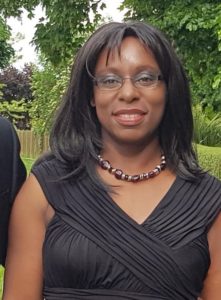
I am 48years old, married and have a son. I love knitting baby clothes, keeping fit, baking and reading crime thrillers.
How were you diagnosed and how long did it take?
In 2015, I started having palpitations which increased steadily over the year. I raised this with my GP and he checked my blood pressure. To our surprise (as my BP was always low) my blood pressure was quite high. Initially my GP thought I could be suffering from ‘white coat syndrome’ where a person only exhibits a higher than normal blood pressure in a clinical setting. On his advice, I purchased my own BP machine and began emailing my results to the surgery.
My BP kept increasing so I added more gym classes to my weekly routine but instead of feeling invigorated afterwards I felt worse. I decreased the amount of salt I ate but did not see any improvements. I was not overweight so could not understand why my blood pressure kept going higher and higher. My life was not particularly stressful, so it was a real conundrum. Finally, my GP insisted that I needed to take medication to lower my blood pressure as the stress on my kidneys and eyes would eventually cause long term damage.
By the end of 2015, I was taking 10mg of amlodipine and 10mg of propranolol each day for hypertension, but my blood pressure was still increasing and uncontrolled. In addition to the palpitations and high blood pressure, I now suffered with tremors, shortness of breath, sweating and headaches. I also felt this constant dread, that something awful was going to happen.
Despite taking a variety of beta blockers religiously each morning, in June 2017, I had a Transient Ischaemic Attack (mini-stroke) and was referred to the Stroke unit. My consultant Dr Durkin (one of my heroes) was amazing. I knew that there was something wrong with me and Dr Durkin listened and believed me! I was overwhelmed with relief. Despite having to remain in bed and being unable to do much for fear of another stroke, I believed that things would get better. Together we started a journey of investigation. Initially, I had numerous tests which confirmed that my heart was functioning properly. The next step was to check that my kidneys were functioning properly. In October 2017 I had an MRI scan. A phaeochromocytoma (neuroendocrine tumour) was discovered. It was approximately 4-5cm in size and had completely obscured my left adrenal gland. Additional tests were ordered by the endocrinology team: 24-hour urine test, blood tests and MIBG imaging.
I was relieved to finally have a diagnosis, however this relief very quickly led to concerns about whether my tumour was related to an inherited disorder which meant that my son could also be at risk of developing a phaeochromocytoma. Fortunately, blood tests confirmed that it was a sporadic tumour and not a genetic mutation.
What treatment have you had and how did it affect you then and now?
Prior to my diagnosis of a phaeochromocytoma, I had been taking various beta blockers and statins (amlodipine, propranolol and atorvastatin) however, after my diagnosis I was prescribed an alpha blocker called phenoxybenzamine.
I was referred to the Endocrinology teams at Stoke Mandeville and Churchill Hospital. My surgeon Mr Sadler (my second hero) progressively increased the dose of phenoxybenzamine to lower the secretion of adrenaline.
For many months, I felt sick and the headaches, palpitations, tremors and sweats intensified despite my dose of phenoxybenzamine steadily increasing to 32 tablets per day. I was admitted onto the GI ward at Churchill Hospital on the 2nd July 2018 where they increased my phenoxybenzamine even further. The aim was to lower my blood pressure to such an extent that I would be unable to stand without support. I think that my body had become so accustomed to this drug that I was able to continue walking to the garden at the end of the ward without feeling lightheaded. On the 5th July 2018, I had an adrenalectomy. The phaeochromocytoma was 6cm. Throughout the operation, I had labile hypertension, where my blood pressure would increase to dangerous stroke levels and then drop drastically to the point where my heart would barely register a beat, so all credit goes to my anaesthetist Dr Hilary Bridge (my third hero) who managed to control my erratic blood pressure.
I was referred to AMEND by Mike Tadman my advanced nurse practitioner (my fourth hero) who has shown incredible patience and understanding throughout this ordeal.
After the operation, my blood pressure immediately returned to a normal level, however, some symptoms persisted (headaches, sweats and less frequently palpitations) which I had not expected and so I felt quite low at times. For histology to confirm whether a tumour is malignant or benign they use the Phaeochromocytoma of the Adrenal gland Scaled Score (PASS). A score of 4 or more out of 20 is used to identify tumours with the potential to behave aggressively. My score was 8 out of 20.
For approximately 1 year, I had 3 monthly appointments with the endocrinology team at Stoke Mandeville hospital and the Churchill Hospital, thus enabling these teams to gather as much data as possible about this rare condition. At the end of 2019, I was discharged from Stoke Mandeville Endocrinology but will remain under the care of the Churchill Hospital for the rest of my life.
Kym Winter from AMEND (my fifth hero) has been a real source of strength and support throughout this ordeal by providing telephone counselling which was invaluable. Her calm demeanour and soothing voice were reassuring.
It is 2020 and I am pleased to say that I am not taking any medication. It has been a long and arduous journey. The fantastic care that I received from all the staff at the NHS and the love and support from my family and friends is why I am able to tell my story.
How has all this affected your family?
It was extremely hard for my husband and son (my absolute heroes) but throughout this ordeal their positive outlook kept me strong. My son completed his Duke of Edinburgh award, supporting other young carers and volunteering at a Residential Care Home.
Natalie with her husband and with her son
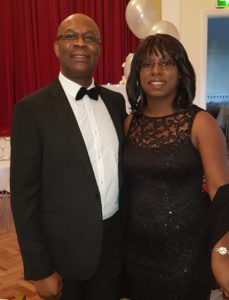
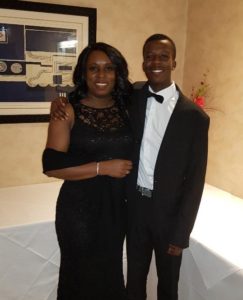
What lessons have you learnt along the way (if any)?
The biggest lessons that I have learnt –
- Trust your instincts, no one knows your body as well as you do. If you feel that things are not right, do not keep quiet. Speak to your doctor.
- “Worrying does not take away tomorrow’s troubles, it just takes away today’s peace”. There is not a lot of information about phaeochromocytoma as they are rare. You can literally scare yourself searching the internet, so I would recommend AMEND who provide accurate, balanced information and have published numerous guides on multiple endocrine neoplasia disorders.
- The value in spending time with family and friends can never be underestimated. No one on their deathbed wishes that they spent more time at the office. I worked tirelessly for a Local Authority for over 14 years and was made redundant whilst going through this ordeal in 2019. I have learnt the importance of working for organisations that: –
- live their values and genuinely care about their employees
- desire to enhance the quality of life for their clients by strengthening their communities
- strive to eliminate barriers to opportunities.
Who’s been your hero? Perhaps it was you!
My heroes are my husband, son and the consultants and nurses that took such great care of me at Churchill and Stoke Mandeville Hospital. The words ‘thank you’ are just not sufficient in expressing my deep gratitude for each and every one of them.
Was AMEND helpful during your journey?
AMEND were extremely helpful and informative. I cannot thank them enough. Unfortunately, I missed the AMEND Annual Patient Information Day in May 2019 because I was back at the Churchill Hospital having my gallbladder removed. Due to COVID-19, the 2020 Annual Information Day was streamed on Facebook and YouTube. I attended a regional peer support meeting via Zoom for the very 1st time in September 2020, where I met some amazing and inspiring ladies who have been diagnosed with various neuroendocrine tumours. Talking and listening to these ladies was such an uplifting experience. I would whole heartedly recommend this support to anyone who has had a diagnosis.
How are you now?
I am well and appreciate the small things so much more now.
-
Jo
Jo’s Story
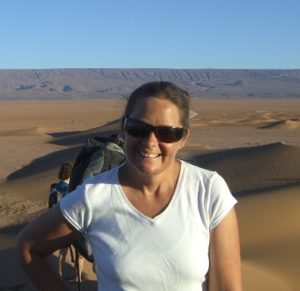
“Do you believe you can fly?” asked the community psychiatrist.
If I didn’t have my head over a bucket puking up the nothing I had eaten for weeks, I would have made HER fly – right out the window – for asking such a stupid question. Wearily I shook my head. Couldn’t she see that I was ILL?
It was the year 2000, and for weeks now I had been retching and vomiting, unable to keep even water down. I had been suffering episodes of severe ‘migraine attacks’, palpitations and breathlessness off and on for 4 years since the birth of my first child, but now they were ever present and significantly worse. My family doctor was insistent, despite my protests, that the attacks were due to postnatal depression and had prescribed a cocktail of drugs to no avail. It seemed the antidepressants and sleeping medications were making things worse and I was now desperate.
“Do you want to harm yourself?” the psychiatrist persisted.
A sensible question at last! All I could manage was to nod pathetically into my bucket. Suddenly, urgent phone calls were made: to my husband to check if I had private health insurance; to my family doctor; to a psychiatric hospital.
“They can take you tonight, it’s all arranged” she said. I could not have cared less anymore.
My husband, Alan and my mother, Janet, carried me almost unconscious into the psychiatric hospital. This quiet unassuming place was to be my saviour. After 4 years of pain, it was now a matter of days before they had diagnosed a large adrenal tumour (NOT post-natal depression). The tumour (a phaeochromocytoma) had been causing my blood pressure to reach immeasurable heights and had put me at serious risk of stroke and heart failure. In fact, the surgeon who finally removed it hadn’t seen anything quite like it for size and activity (probably because he doesn’t perform post-mortems).
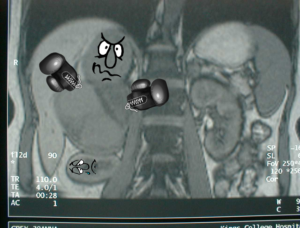
Once again, things began to move fast. Within the space of the next few years I was genetically diagnosed with multiple endocrine neoplasia type 2a (MEN2a), along with my mother and my then 2 ½ year old son; I had both tumour-containing adrenal glands removed along with my cancerous thyroid, as did my mother; and my son had a prophylactic removal of his thyroid to avoid developing thyroid cancer.
I do relatively well now, on a cocktail of different drugs, and am regularly monitored for optimum doses and disease recurrence (which resulted in the replacement of one of my shoulders in 2007 due to a thyroid cancer bone metastasis). My son is closely monitored for signs of phaeochromocytomas.
As you might expect, primary healthcare is one area of concern for me for patients with rare diseases like MEN and Phaeo Para; particularly regarding diagnosis. The specialist UK NHS hospital team were fantastic throughout, confirming the need for rare diseases like MEN to be managed in an expert multidisciplinary setting.
I had so very nearly died and this would have left 2 very young children motherless. The thought of what could have happened still haunts me today.
[Jo is now the CEO of AMEND and Phaeo Para Support UK]
-
Jodie
Jodie’s Story
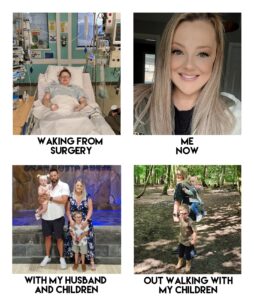
Tell us about yourself?
My name is Jodie, I am 32 years old. I was 31 at the time of diagnosis. I am a qualified Accountant, working as a Head of Finance. I have a husband and 2 young children – 1 boy, 1 girl – who are my world. I enjoy walks in the great outdoors, eating out and spending time with my family.
How were you diagnosed and how long did it take?
When I was 39 weeks pregnant with my youngest (now 19months old), I started with extremely aggressive pounding headaches, so much so that I thought my brain was going to explode – it was so painful, I was screaming in agony. My husband called for an ambulance, they did a few checks and found that my blood pressure was excessively high and I was in hypertensive crisis. I had never had issues with blood pressure before, even the prior week at my midwife appointment my BP was 120/70 so very good and normal. But during the hypertensive crisis, it was probably double that if I remember it right. The doctors couldn’t understand as I didn’t have pre-eclampsia. Anyway, they induced me, I gave birth naturally, and both me and baby were fine.
Following on from the birth, I had to stay on blood pressure tablets to try to keep my BP down but every week I found myself back at the GP with high BP that was not coming down despite being on high doses of blood pressure medications. Week in week out, I would have to increase my dosage and add in new BP tablets. Then I started to have other symptoms too, so would be back at the doctors to discuss those – they put it down to side effects of the medication. BP was still not coming down so I was put on yet another BP medication. I was then on high doses of 4 different BP meds… and my BP was still around 150/100 while highly medicated on the 4 BP meds. Other symptoms were – tremors, headaches, fatigue, pre-diabetes, excessive thirst, flushing and sweating, digestion issues, constipation, nausea, abdominal pain, high heart rate, anxiety, heart palpitations, excessive thirst.
At around 10-11 months post birth, it got so bad that I was in agony, crippled over with abdominal pain – I knew something wasn’t right. I had known gallstones so thought it could be pancreatitis, so I went to the GP about that, then ended up in A&E over the weekend as the pain had got worse. I had severe hypokalemia (low potassium) hypophospataemia (low phosphate) and hyperglycaemia (high blood sugar), so they put me on drips and supplements to help with all of that. I was kept in hospital and while doing scans of my gallbladder and pancreas, they came across something else….. a tumour on my adrenal gland. And I had Cushings Syndrome caused by the tumour.
I was in hospital for quite a while, while I underwent lots of tests – blood tests, urine tests, MRI scans, CT scans, PET scans, salivary tests to name a few. I was under the care of a team at Preston Royal Infirmary (Preston, UK) and then was transferred to The Christie (Manchester, UK) where I was under the care of Dr Adam. I’d had dexamethasone suppression tests and apparently I did not respond well to them – my mum passed lots of information on to Dr Adam about this and how it affected me, and I believe this enabled him to get onto the right research path to find what exactly my tumour was. I had a pheochromocytoma, which is very rare… but even rarer, mine was an ACTH secreting pheochromocytoma. My cortisol and adrenaline levels were over 10 times higher than normal range.
So from my initial symptoms to diagnosis, it took around 11 months. But I think this was only due to my symptoms being so severe and my levels being so high. I was very lucky that my Endocrinology teams were able to diagnose and treat me so quickly, as I know some people wait several years for their diagnosis. I am very grateful to my Endocrinology specialists.
What treatment did you have and how was that?
I was kept in hospital for a total of 11 weeks from initial A&E admission. I was treated with lots of drips to keep my potassium, sodium and phosphates up. I was on a lot of medication to treat the high BP and pheo. During my time in hospital, my cortisol was so high that it caused psychosis, hallucinations and delusion… this was very strange and I do still get flashbacks of certain bits but thankfully don’t remember most of it.
The doctors worked really hard to get my BP low enough so that they could operate. There were lots of struggles, lots of tests, and lots of lonely days. Finally, after 2 months in hospital, I had surgery (open unilateral adrenalectomy). And I began to feel better immediately. I had 8 weeks of recovering from the surgery and I was on hydrocortisone to artificially increase my cortisol levels while my remaining adrenal gland started to “wake up” and begin to work again. Then after several months of reducing the dosage, I was able to come off the medication all together. Now, I am completely medication free and feeling more like myself again!
How did all of this affect your family?
My family has been through so much – watching me be so poorly, not knowing what was going to happen, and pushing through regardless. They were so strong!
It was a really scary time for us all. Thankfully, I don’t remember a lot of it. Being the breadwinner in the family, it put financial strain on us as I had to have time out of work. There was a lot of uncertainty and it was very hard for everyone in many different ways!
Now, we are very grateful that I have my health and we are all together again.
What lessons have you learnt along the way?
To trust myself, trust my body. To never give up and fight for what is right for yourself. To advocate for yourself.
I have also learnt that family is everything (moreso than I already knew) and the small things in life are what really matter.
Who’s been your hero?
Myself – for everything I have been through, for bouncing back stronger than before!
My mum – for her support and help with my children, and for her input and care during my time in hospital. My story would be very different if not for her. And I simply can’t thank her enough for all the support she gave in so many ways.
My husband and children – for their bravery whilst I was in hospital and during my recovery. It must have been so scary for them and they were amazing throughout!
Dr Adam @ The Christie – for being the best Endocrinology specialist and doing everything possible to get my right diagnosis, ensuring I got the right care, and also being so supportive both during my time in hospital and thereafter.
How are you now?
I am feeling good! Much more like myself. I am working full time in a brilliant role, I am there to support my family and enjoy being with them, and I am extremely thankful!! Hoping to spread awareness and help others who have pheo or similar, help them to see that there is light at the end of the tunnel!